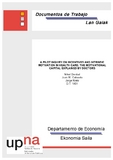Mostrar el registro sencillo del ítem
A pilot inquiry on incentives and intrinsic motivation in health care: the motivational capital explained by doctors
| dc.creator | Berdud, Mikel | es_ES |
| dc.creator | Cabasés Hita, Juan Manuel | es_ES |
| dc.creator | Nieto Vázquez, Jorge | es_ES |
| dc.date.accessioned | 2016-05-10T07:40:38Z | |
| dc.date.available | 2016-05-10T07:40:38Z | |
| dc.date.issued | 2014 | |
| dc.identifier.uri | https://hdl.handle.net/2454/20644 | |
| dc.description.abstract | Where the contracts are incomplete, the resulting co-ordination problems may be attenuated if workers are intrinsically motivated to do the work. It is established by theoretical and empirical literature that workers within public organizations are intrinsically motivated to exert effort doing the job and have a strong sense of social agents with the mission of providing collective goods to citizens and tax payers. This paper is an empirical pilot study in the health care sector using methods of Qualitative Analysis research. We run semistructured interviews á-la-Bewley to sixteen physicians of Navarre’s health Care Servicio Navarro de Salud-Osasunbidea (SNS-O). The objective of the work is twofold: first, to find empirical evidence about doctors’ non-monetary motives and second, to find evidence about how these non-monetary motives shape doctors’ behavior. We formulate several testable hypotheses: (1) Doctors are intrinsically motivated agents, (2) Economic incentives and control policies may crowd-out intrinsic motivation and (3) Well designed incentives may crowd-in agents intrinsic motivation. Results confirm the hypotheses formulated above and coming from our theoretical findings [11], [12]. Finally, we also found empirical evidence of conflict between political advisors or health managers (principals) and physicians (agents). Results are a step forward in the optimal design of incentive schemes and policies which crowd in doctors’ intrinsic motivation. | en |
| dc.description.sponsorship | The authors are grateful to the Spanish Ministry of Science and Innovation for financial support of this project (Project ECO2009-12836). | en |
| dc.format.extent | 57 p. | |
| dc.format.mimetype | application/pdf | en |
| dc.language.iso | eng | en |
| dc.relation.ispartofseries | Documentos de Trabajo DE - ES Lan Gaiak | es |
| dc.relation.ispartofseries | 1401 | en |
| dc.rights | CC Attribution-NonCommercial-NoDerivatives 4.0 International (CC BY-NC-ND 4.0) | en |
| dc.rights.uri | https://creativecommons.org/licenses/by-nc-nd/4.0/ | |
| dc.subject | Qualitative research | en |
| dc.subject | Interviews | en |
| dc.subject | Intrinsic motivation | en |
| dc.subject | Crowding effects | en |
| dc.title | A pilot inquiry on incentives and intrinsic motivation in health care: the motivational capital explained by doctors | en |
| dc.type | Documento de trabajo / Lan gaiak | es |
| dc.type | info:eu-repo/semantics/workingPaper | en |
| dc.contributor.department | Economía | es_ES |
| dc.contributor.department | Ekonomia | eu |
| dc.rights.accessRights | Acceso abierto / Sarbide irekia | es |
| dc.rights.accessRights | info:eu-repo/semantics/openAccess | en |
| dc.relation.projectID | info:eu-repo/grantAgreement/MICINN//ECO2009-12836/ES/ | en |



